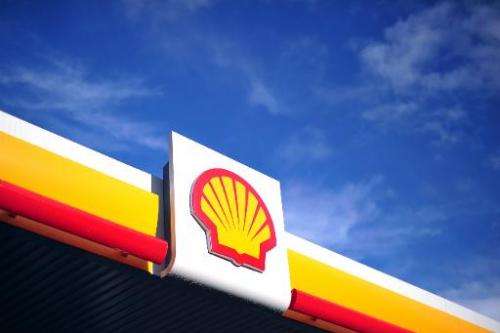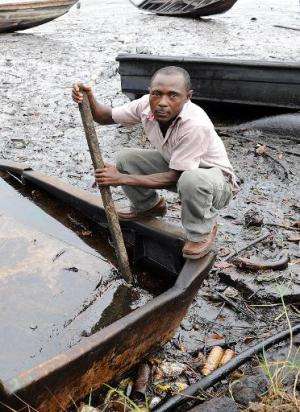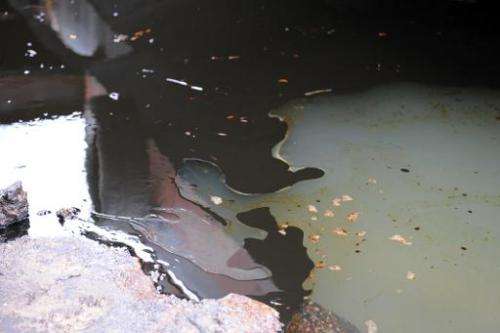Shell strikes Nigerian oil spills compensation deal (Update)

Royal Dutch Shell is to pay more than $80 million to a Nigerian fishing community "devastated" by two serious oil spills in 2008, it was announced Wednesday, while the clean-up could take years.
The Anglo-Dutch energy giant's Nigerian arm has agreed to pay £55 million ($83.5 million, 70 million euros) to people in Bodo, a town in southern Nigeria, following a three-year legal battle.
The Shell Petroleum Company of Nigeria (SPDC) will pay around £35 million compensation to 15,600 Nigerian fishermen whose livelihoods were affected, and a further £20 million to the wider community.
Each individual will receive around £2,200, equivalent to around three years' income on the Nigerian minimum wage, said their London-based lawyers Leigh Day, who have received the money.
SPDC is set to clean up the affected area, but insisted most oil pollution in the Niger Delta region was caused by sabotage, theft and illegal refining. Commentators said the clean-up could take several years.
Amnesty said the Bodo community had been "devastated" by the spills and, without compensation, fishermen and farmers had faced poverty in the years since.
The rights group called the settlement an "important victory for the victims of corporate negligence".
Clean-up could take years
Chief Sylvester Kogbara, chairman of the Bodo council of chiefs and elders, said his community was happy the case had finally been laid to rest and hoped it would forge better relations between Shell and other Delta communities "impacted in the same way as us".
"We are hopeful that the clean-up of the Bodo environment will follow suit in no distant time," he said.
The clean-up is expected to begin over the next two to three months.

Nigerian ecologist Ako Amadi, who heads the Community Conservation and Development Initiative group, said this was more important that the compensation.
"The issue is whether (the Bodo people) can go back to their activities which were fishing and farming," he said.
"Even if both the Nigerian government and Shell get very serious about it, it could take at least five to 10 years to restore things to where they were before the oil spills.
"It's about the restoration of the ecosystem and of the livelihood of the Bodo people."
Nigeria is Africa's biggest crude producer, but much of the Niger Delta oil region remains deeply impoverished.
Decades of spills have caused widespread pollution in the region.
Compensation could inspire others
Leigh Day claimed Shell made an early offer of £4,000 compensation; sources claimed the community's lawyers were seeking more than £300 million.
SPDC managing director Mutiu Sunmonu said the company had accepted responsibility for the "deeply regrettable" operational failures on the Bomu-Bonny pipeline "from the outset".

"We've always wanted to compensate the community fairly and we are pleased to have reached agreement," he said.
"We are fully committed to the clean-up process. Despite delays caused by divisions within the community, we are pleased that clean-up work will soon begin."
Sunmonu added: "However, unless real action is taken to end the scourge of oil theft and illegal refining—which remains the main cause of environmental pollution and is the real tragedy of the Niger Delta—areas that are cleaned up will simply become re-impacted through these illegal activities."
SPDC accepted in November that the spills were greater than the previously-reached total figure of 4,144 barrels, though they did not give an amount.
Amnesty International claimed the first leak could have exceeded 100,000 barrels, while Leigh Day claimed both spills could have entailed 600,000 barrels.
A small number of claims by neighbouring communities are potentially heading towards settlement in Nigeria.
Stvyn Obodoekwe from the Centre for Environment, Human Rights and Development, which works on environmental and development issues in the Niger Delta, described the settlement as "very, very significant".
"Shell and other operators will now need to be very careful, knowing that they can be found liable," he said.
"More actions could come in due course because people have seen there's hope."
© 2015 AFP





















